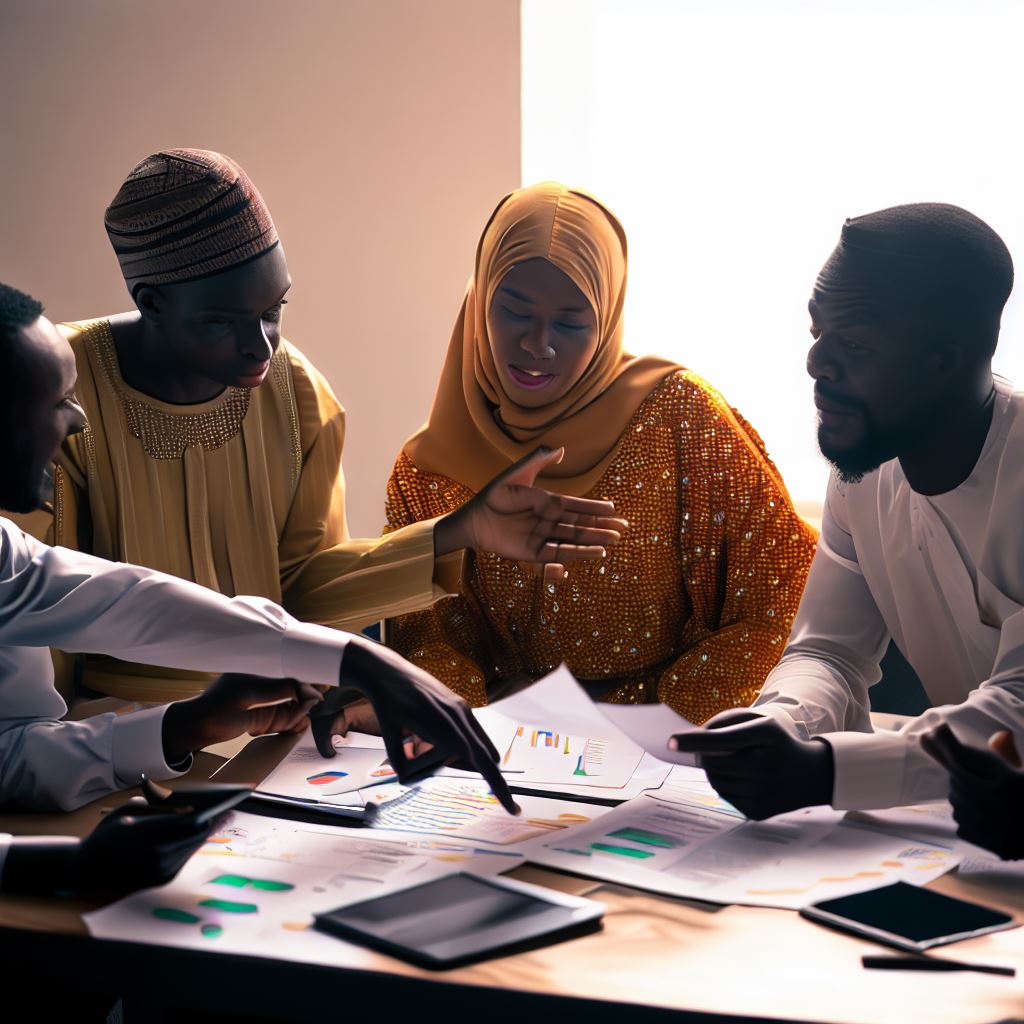Introduction
Women have long been underrepresented in the field of mathematics, facing various challenges and barriers. In Nigeria, the perspective on women in mathematics is particularly noteworthy.
In this blog post, we will delve into the experiences and achievements of Nigerian women in mathematics, shedding light on the unique challenges they face and the inspiring accomplishments they have made.
From the limited access to education to cultural stereotypes and biases, Nigerian women have encountered numerous obstacles in pursuing their mathematical passions.
However, despite these barriers, they have displayed remarkable resilience and determination, making significant contributions to the field.
Their achievements have not only shattered gender stereotypes but have also served as a source of inspiration for aspiring female mathematicians across the country.
We will explore the initiatives and organizations in Nigeria that are working towards promoting gender equality in mathematics and fostering a supportive environment for women in the field.
By highlighting the perspectives of Nigerian women in mathematics, we aim to raise awareness about the importance of inclusivity and equal representation, ultimately motivating more women to pursue careers in this male-dominated field.
Historical Background
In Nigeria, women have historically faced numerous challenges in pursuing mathematics.
They were discouraged from studying math due to societal expectations and gender stereotypes.
Women were often discouraged from pursuing higher education, especially in STEM fields.
This lack of support limited women’s access to math education and career opportunities.
Despite these challenges, there were key figures in Nigerian mathematics who empowered women.
One such figure is Professor Ayodele Awojobi, a renowned mathematician and engineer.
Professor Awojobi advocated for equal opportunities for women in math and STEM fields.
His advocacy prompted the introduction of programs and initiatives to support women in mathematics.
Another influential figure is Professor Adenike Osofisan, a prominent mathematician and educator.
Professor Osofisan established the African Women in Mathematics Association (AWMA).
AWMA aims to empower and support women pursuing careers in mathematics.
The organization provides resources, mentorship, and networking opportunities for women mathematicians.
Through AWMA, many Nigerian women have been able to overcome societal barriers and excel in mathematics.
Additionally, the Federal Ministry of Education in Nigeria has introduced policies to promote gender equality in education.
These policies aim to increase the enrollment of women in STEM fields, including mathematics.
As a result of these initiatives, more Nigerian women are now studying and pursuing careers in mathematics.
Despite the progress, challenges still exist for women in mathematics in Nigeria.
Women still face gender biases and stereotypes that can hinder their advancement in the field.
There is a need for continued advocacy and support to address these challenges.
Overall, the historical challenges faced by women in pursuing mathematics in Nigeria have been significant.
However, with the help of key figures and supportive initiatives, women are breaking barriers and excelling in the field.
It is crucial to continue empowering and supporting women in mathematics to ensure equal opportunities and representation.
Read: Teaching Mathematics in Nigeria: A Career Overview
Current Status of Women in Mathematics in Nigeria
1. Present statistical data on the representation of women in mathematics in Nigeria.
According to recent statistics, women make up only approximately 30% of mathematics professionals in Nigeria.
This number is significantly lower compared to their male counterparts, indicating a significant underrepresentation of women in the field.
Despite efforts to promote gender equality, progress in increasing women’s participation in mathematics has been slow.
2. Discuss factors that contribute to the underrepresentation of women in the field.
Gender stereotypes and societal expectations play a major role in discouraging girls and women from pursuing mathematics.
Lack of female role models and mentors in the field leads to limited visibility and inspiration for future mathematicians.
Limited access to quality education, particularly in rural areas, hinders girls’ opportunities to excel in mathematics.
Cultural biases and traditional gender roles often prioritize domestic responsibilities over career aspirations for women.
The academic environment can sometimes be hostile, with discrimination and unconscious bias affecting women’s experiences and opportunities.
3. Identify strategies to address the underrepresentation of women in mathematics in Nigeria.
Encouraging early interest in mathematics through engaging and inclusive educational programs that target young girls.
Providing scholarships and financial support specifically for women pursuing mathematics education and careers.
Promoting the visibility of successful women mathematicians as role models to inspire and empower future generations.
Advocating for policies that address gender inequity in education and promote equal opportunities for girls in mathematics.
Establishing mentorship programs to provide guidance and support for women at all levels of their mathematical careers.
Raising awareness about the benefits and potential of mathematics careers for women to challenge societal norms and stereotypes.
4. Highlight success stories and initiatives that aim to increase women’s representation in mathematics.
The Association for Women in Mathematics Nigeria (AWMN) has been actively promoting the participation of women in mathematics through conferences, workshops, and networking opportunities.
STEM-focused organizations and NGOs in Nigeria are working towards bridging the gender gap in math education and providing inclusive learning environments.
Some universities have introduced mentorship programs and scholarships specifically targeted at increasing women’s participation in mathematics.
Women mathematicians in Nigeria have made significant contributions to research and academia, breaking barriers and inspiring future generations.
Overall, while progress has been made, the underrepresentation of women in mathematics in Nigeria remains a significant challenge.
Addressing this issue requires a multi-faceted approach involving society, educational institutions, and policy frameworks to create a more inclusive and supportive environment for women in the field of mathematics.
Read: Top Universities for Physics Studies in Nigeria
Success Stories of Nigerian Women in Mathematics
1. Profiling Prominent Nigerian Women Mathematicians and their Achievements
1. Dr. Ngozi Osuagwu
- Recognized as one of Nigeria’s leading mathematicians.
- Recipient of the prestigious Nigerian Mathematical Society’s Research Excellence Award.
- Published groundbreaking research papers in the field of abstract algebra.
- Inspires young women to pursue careers in mathematics through mentorship programs.
2. Prof. Adeola Adesina
- Renowned for her contributions to mathematical modeling.
- Received the Nigerian Academy of Science Gold Medal for Excellence in Mathematics.
- Pioneered the development of mathematical models for predicting disease outbreaks.
- Mentors aspiring female mathematicians, emphasizing the practical applications of mathematics.
3. Dr. Patricia Alabi
- Internationally recognized for her research in numerical analysis and scientific computing.
- Awarded the prestigious Abel Prize for her groundbreaking algorithms in computational mathematics.
- Leads workshops and seminars to encourage young Nigerian women to pursue mathematical research.
- Advocates for the integration of mathematics education with computer science.
2. Emphasizing the Importance of Role Models for Inspiring Young Women in Nigeria
Role models inspire young women to pursue math careers in Nigeria, showcasing success stories, shattering stereotypes, and providing mentorship.
Their exceptional work contributes to math’s advancement and challenges societal norms, emphasizing gender equality.
Prominent women mathematicians serve as tangible examples, instilling confidence and perseverance in aspiring female mathematicians.
Mentorship programs led by these role models create a supportive network for young women, fostering a sense of belonging.
Essentially, these women mathematicians inspire the next generation, breaking barriers and nurturing talent within Nigeria’s mathematical community.
Read: Math in Nigeria: A Glimpse at Industry and Academia

Initiatives and Programs SuppoNigeria’s Famous Mathematicians: Achievements and Worksrting Women in Mathematics
Nigeria boasts numerous programs and organizations supporting women in mathematics, fueling female participation in the field:
- African Women in Mathematics Association (AWMA) champions active involvement through conferences and mentoring.
- Association for Women in Mathematics, Nigeria Chapter (AWMN) nurtures a network, provides mentoring, and advocates for female mathematicians.
- Girls in Mathematics Foundation (GMF) inspires girls through training, workshops, and competitions.
- National Mathematical Centre (NMC) promotes math education and offers scholarships for girls.
- STEM programs implement initiatives to attract, mentor, and guide young women in mathematics.
These initiatives foster collaboration, boost confidence, and create role models for women in mathematics. They stimulate early interest in math, especially among girls, through workshops and competitions.
Scholarships break down financial barriers, ensuring equal opportunities for aspiring female mathematicians.
The impact is evident in increased female representation in research, academia, and industry, challenging gender stereotypes in STEM.
In essence, Nigeria’s array of programs and organizations actively supports and encourages women in mathematics, making substantial strides in achieving gender equality in the field.
Read: Nigeria’s Famous Mathematicians: Achievements and Works
Delve into the Subject: Meet Nigeria’s Top Atmospheric Scientists: A Review
Challenges and Opportunities for the Future
Identifying ongoing challenges faced by women in mathematics in Nigeria
- Gender bias: Women face discrimination and stereotypes that discourage their participation in mathematics.
- Lack of representation: There is a low number of women in mathematics departments and academic positions.
- Limited opportunities: Women have fewer chances for funding, research collaborations, and career advancement.
- Cultural barriers: Traditional beliefs and societal expectations hinder women from pursuing mathematics.
- Access to education: Limited access to quality education, especially in rural areas, hampers women’s progress in the field.
Discussing potential strategies for promoting gender equality in the field
- Advocacy and awareness: Raise awareness about the importance of gender equality in mathematics through campaigns, workshops, and seminars.
- Mentorship programs: Establish mentorship programs where successful women mathematicians can guide and support young female mathematicians.
- Encouraging role models: Highlight successful women mathematicians as role models to inspire and motivate aspiring mathematicians.
- Providing scholarships and grants: Offer financial support specifically for women in mathematics to encourage their involvement.
- Addressing cultural barriers: Promote a change in the perception of gender roles by challenging cultural stereotypes and biases.
- Equal opportunities: Ensure equal access to funding, research opportunities, and promotions for both men and women.
- Improving educational infrastructure: Invest in improving the quality and accessibility of mathematics education, especially in rural areas.
- Collaboration and networking: Encourage collaboration and networking opportunities for women mathematicians to enhance their visibility and professional growth.
- Policy changes: Advocate for policies that promote gender equality in mathematics education, hiring, and career advancement.
- Empowering women: Provide training and resources to enhance the skills and confidence of women mathematicians.
In a nutshell, women in mathematics in Nigeria face several challenges, including gender bias, limited opportunities, and cultural barriers. However, there are opportunities to promote gender equality in the field.
By advocating for awareness, mentorship programs, scholarships, and policy changes, women can be empowered to succeed in mathematics.
It is crucial to address these challenges and seize these opportunities to create a more inclusive and diverse mathematical community in Nigeria.
Conclusion
In this blog post, we discussed the challenges women face in pursuing mathematics in Nigeria. Despite societal and cultural barriers, women have made significant contributions to the field.
To support and advocate for women in mathematics, we must encourage equality and opportunities.
By providing mentorship, scholarships, and promoting diversity, we can create a more inclusive and supportive environment.
Together, we can inspire and empower more women to pursue their passion for mathematics and contribute to Nigeria’s development and progress.
Let’s strive for a future where gender doesn’t limit anyone’s potential in mathematics.




